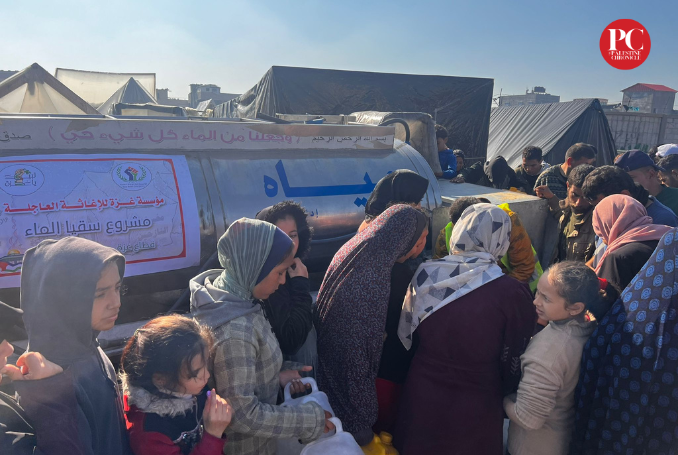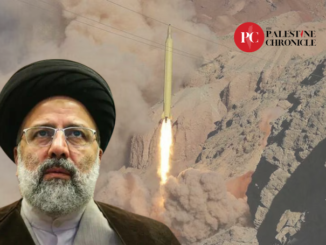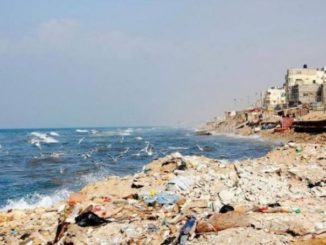
UN officials have called for the immediate restoration of water infrastructure, and the opening of border crossings, amongst others, in order to avert an imminent famine.
Senior UN officials have warned the Security Council of imminent famine in the besieged Gaza Strip, urging immediate action to avert a humanitarian disaster.
“The people of Gaza are experiencing catastrophic levels of conflict-induced food insecurity and a high risk of famine, and that risk is increasing by the day,” Deputy Director-General of the Food and Agriculture Organization of the United Nations (FAO) Maurizio Martina said.
He was speaking at the United Nations Security Council High-Level Open Debate on the Protection of Civilians in Armed Conflict on Tuesday.
In this context, Martina called for “immediately restoring cross-border water pipelines, resuming electricity distribution, and restoring health facilities, water infrastructure, facilities for waste management, food processing and production, financial facilities, telecommunications,” according to a press statement by the FAO.
AL-JAZEERA: A Palestinian girl, Sahar Al-Badda, died of hunger in the northern Gaza Strip.
FOLLOW OUR LIVE BLOG:https://t.co/9cnXFI22Qu pic.twitter.com/HyIUfcIk4v
— The Palestine Chronicle (@PalestineChron) February 28, 2024
He highlighted the need for reopening border crossings, including for commercial traffic.
Right to Food
Stressing that the Right to Food is a basic human right, Martina said “Essential commodities must be allowed to move into and throughout Gaza without interruption or limitation.”
Martina cited key findings from the latest Integrated Food Security Phase Classification (IPC) analysis, saying it is “extremely troubling.”
‘No Food, No Water. Shame on the World!’ – Gaza’s Children Decry Aid Scarcity (VIDEO)
According to the IPC analysis, the entire population of about 2.2 million people in the Gaza Strip is estimated to be in Crisis or worse (IPC Phase 3 and above), the highest percentage of people experiencing such acute food insecurity that the IPC has ever classified for any given area or country.
About 50 percent of the population is projected to be in Emergency (IPC Phase 4) and at least one in four households (more than half a million people) conservatively assessed to now be in Catastrophic or famine-like conditions (IPC Phase 5).
“If nothing changes, a famine is imminent in northern Gaza,” warned Carl Skau, Deputy Executive Director of the World Food Programme (WFP).
“We must all live up to our responsibilities to ensure it does not happen on our watch.”
Skau warned of the critical prospects of famine by May this year, adding that “Gaza is seeing the worst level of child malnutrition anywhere in the world. One child in every six under the age of two is acutely malnourished.”
He stressed the need for a “a safe and functioning operating environment for humanitarian staff, the port of Ashdod and the Karni crossing to be open, a working humanitarian notification system, and a stable communications network.”
Over a Month Since Aid Arrived to Northern Gaza – UNRWA Sounds Alarm Bells
He said that without safe and greatly expanded access, aid workers cannot mount a relief operation at the scale required to reverse the severe humanitarian crisis in the Strip.
Suspension of Aid
On that, he reported that WFP was forced to pause deliveries of food to northern Gaza.
“We have a duty to protect our staff,” he emphasized.
Ramesh Rajasingham, Director of Coordination at the Office for the Coordination of Humanitarian Affairs, reporting on the grave situation in Gaza, said that currently at least 576,000 people there — one quarter of the population — are “one step away from famine”.
“Unfortunately, as grim as the picture we see today is, there is every possibility for further deterioration,” observed Rajasingham.
‘Death Sentence’ – UN to Suspend Food Aid Delivery to North Gaza
He emphasized that hunger and the risk of famine are exacerbated by factors that go beyond just the availability of food.
Inadequate water, sanitation and health services create a cycle of vulnerability, where malnourished people — especially among the tens of thousands injured — become more susceptible to disease that further depletes the body’s nutritional reserves.
“Add chronic overcrowding, exposure to the cold and an absence of adequate shelter to this lack of nutrition, and you have created the conditions for massive disease epidemics,” he stressed.
(PC, Anadolu)









Be the first to comment